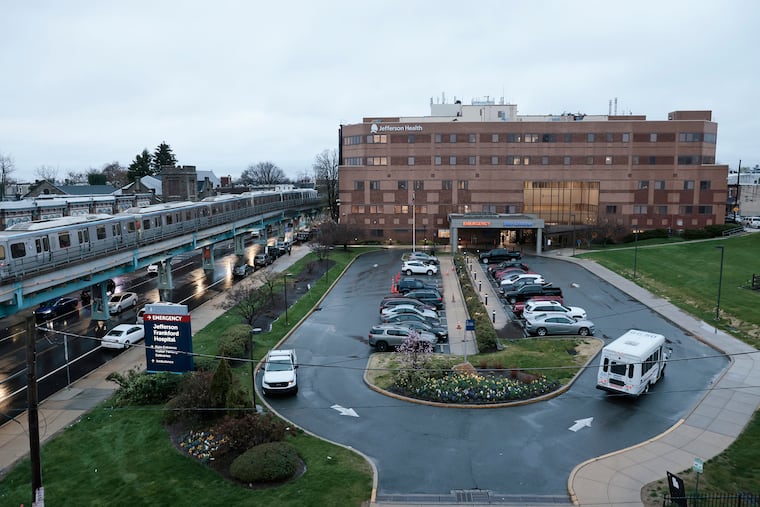Jefferson Frankford Hospital to open a secure ward for incarcerated patients
It’s part of an ongoing effort by the prisons department to address the impact of short staffing that has plagued the jails for years and has contributed to delays in medical care.

Later this month, the Philadelphia Department of Prisons will open a secure ward inside Jefferson Frankford Hospital in Northeast Philadelphia, equipped to accommodate up to nine incarcerated people in need of hospital care that the city jails cannot offer.
It’s part of an ongoing effort by the department to address the impact of short staffing that has plagued the jails for years and has contributed to delays in medical care.
The arrangement was detailed in court filings submitted as part of a class-action lawsuit filed in April 2020 over conditions in the city jails. On Thursday, a federal judge said he planned to hold the city in contempt of court in that suit, concluding that it had not fulfilled the conditions of an agreement it entered into to improve staffing and other conditions at the jails.
Currently, people in the city jails who require hospital care must be accompanied by two correctional officers at their bedside at all times, court records show. The secure ward will be staffed with three to five correctional officers on 12-hour shifts, plus one supervisor, allowing more staff to remain on-site at the jails.
Prisons Commissioner Michael Resnick disclosed the details in court filings presented as evidence that the city is working to improve conditions in its jails. In creating the hospital ward, the city aims to improve the staffing crisis inside jails by cutting down on the numbers of officers who leave the jail to monitor incarcerated people getting hospital care.
A spokesperson for his department declined further comment about the Frankford Hospital ward. At Thursday’s court hearing, Resnick said he could not comment on the contempt ruling.
In a statement, Jefferson Health spokesperson Damien Woods said that Frankford Hospital already treats incarcerated patients and that a secure unit would “enhance both patient care and staff preparedness.”
He said the ward’s opening is part of a larger move to expand services at the Frankford Hospital campus and that discussions with potential partners about that expansion are “ongoing.”
The ward will open on July 22, according to court filings.
Fixing understaffing in the city jails
A nine-patient ward may not be enough to accommodate the number of people the jails must send out for inpatient hospital stays on a regular basis. In May of this year alone, Resnick wrote in court filings, about 30 people at the jail required “non-trauma-level care” in a hospital inpatient setting.
Collectively, those people spent 63 days in the hospital — which meant that correctional officers spent 252 shifts observing them, away from their shifts at the jail, Resnick wrote.
There are 45 correctional officers assigned to transport and monitor patients at the hospital, Resnick wrote. If more incarcerated people require hospital care than the transport unit can handle, other corrections officers from the city’s various jails pick up the slack.
The new ward could free up as many as 26 correctional officers, Resnick wrote.
Philadelphia jails do provide some medical care on-site, but the staffing crisis there — there is a shortage of about 800 correctional officers — has made it difficult for jail physicians to deliver that care on time.
Patients hoping to enter its addiction medication treatment program, for example, regularly wait 15 days for their first dose. And contraband drugs that make their way into the prison in part because of understaffing have fueled a number of overdoses.
In his court filing, Resnick outlined other efforts the jails are taking to mitigate its staffing crisis, including recruiting efforts and increasing salaries. He said he has also been regularly meeting with District Attorney Larry Krasner, the Defender Association of Philadelphia, and a judge overseeing local prison reform plans to reduce the population of incarcerated people in the city.